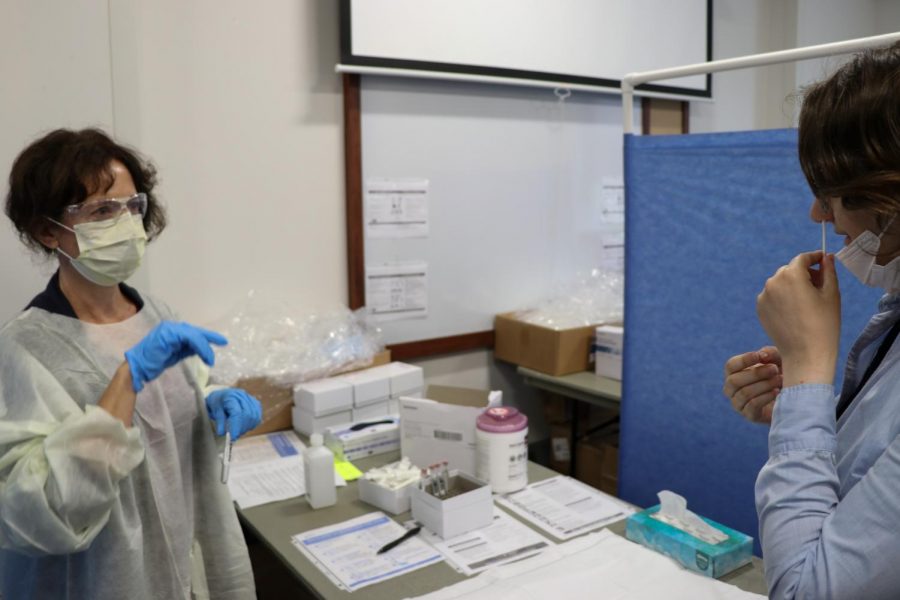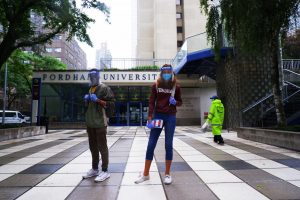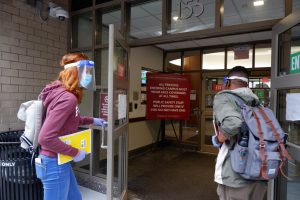A Basic Breakdown: COVID-19 Tests
COVID-19 testing through the University Health Center, one of multiple testing options, requires students to swab themselves while a nurse or FUEMS member looks on to ensure it is done correctly.
August 24, 2020
As many Fordham students prepare to reenter campus for the fall 2020 semester, COVID-19 testing is becoming increasingly relevant to our community since individuals must produce a recent negative result in order to return to campus.
However, this is a source of extreme confusion for many — how many kinds of tests are there? How are they performed? How long will it take to get the results? In order to answer these questions and hopefully alleviate some of the stress they cause, here’s a simple breakdown of different types of COVID-19 tests.
According to the U.S. Food and Drug Administration (FDA), COVID-19 tests can be broken down into two categories: diagnostic tests and antibody tests. Diagnostic tests demonstrate whether or not the testee has an active COVID-19 infection. Antibody tests determine if COVID-19 antibodies, or the immune system’s response to a specific infection, are present in one’s body, but are not used to diagnose one with COVID-19.
New York Forward, New York State’s reopening plan, has now entered phase four of reopening in all regions, including New York City. The plan states that, as of Jul. 1, diagnostic testing is available to all residents statewide.
Diagnostic Tests
There are two types of diagnostic tests: molecular tests and antigen tests.
Molecular tests are mostly performed via a nasal or throat swab, though in a few cases, samples of saliva are used instead. Results are generally returned within a week, are highly accurate and typically do not require repetition of test or confirmation from other types of tests.
Antigen tests also use a nasal or throat swab. Results are returned within an hour. Generally speaking, an antigen test with a positive outcome is very accurate. An antigen test with a negative outcome is less so, so molecular tests are often used to uphold this result. Science Magazine states that antigen tests are generally cheaper and faster, so many scientists promote them in efforts for more widespread testing.
Compared to molecular tests, antigen tests have a higher chance of a false negative result, which indicates that an individual does not have an active COVID-19 infection when they actually do. Neither of these types of tests can tell if an individual has previously been infected with COVID-19.
Antibody Tests
Antibody tests are performed via a blood draw or finger prick. Results are typically obtained within one to three days, although some locations can return them on the same day. A second antibody test will provide more accurate results than just one. Antibody tests cannot be used to determine if an individual is actively infected with COVID-19— they only show whether or not one has been previously infected.
No test for either active infection or antibodies is accurate 100% of the time.
What type of test do I need to come back to Fordham?
In an Aug. 11 email, Fordham University Health Services outlined details about required COVID-19 testing. Community members were recommended to get tested at an off-campus site within seven days of their arrival to campus, but in the event that an individual is not able to do so, on-campus testing is available as of August 15. Registration for on-campus testing at both the Lincoln Center and Rose Hill campuses is available on the Fordham Forward webpage.
Fordham requires off-campus tests to be “a FDA EUA authorized PCR saliva or nasal swab test.” This type of test falls into the diagnostic molecular test category, which is likely due to the fact that results are less prone to error than antigen tests.
The university’s email provides several resources for locating testing sites near you. The Centers for Disease Control and Prevention (CDC) recommends contacting your health care provider if or when you want to get tested. If you are not tested but have symptoms of COVID-19, the CDC urges you to stay at home.















